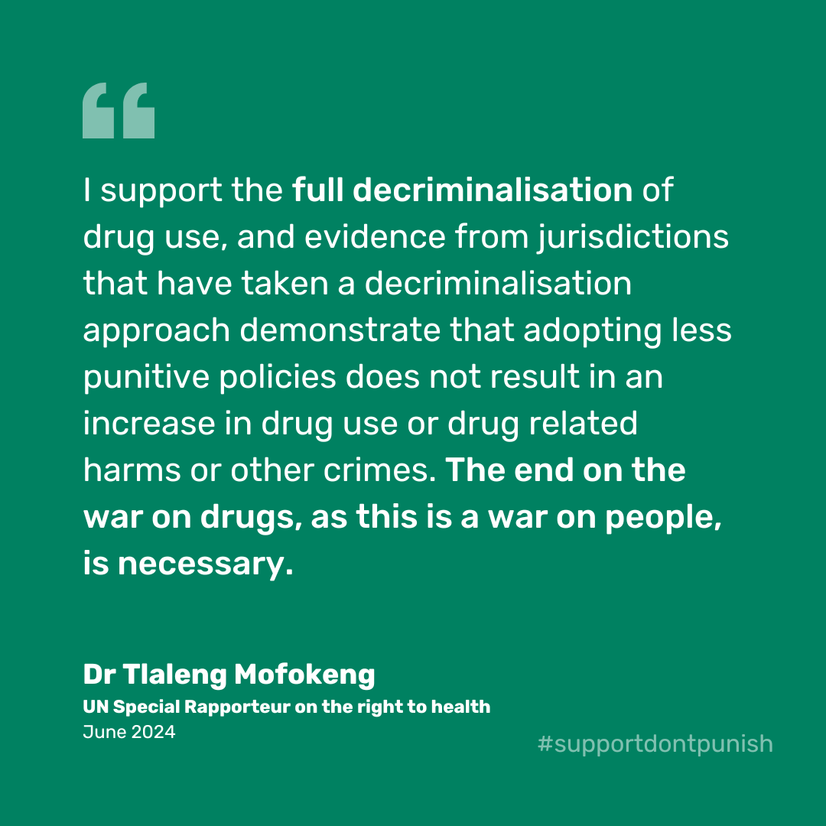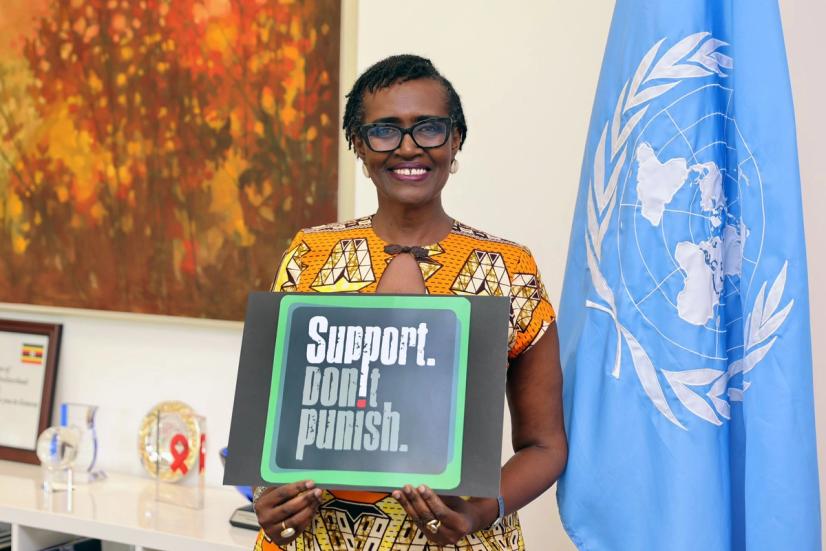boyphare - shutterstock
The 2024 World Drug Report: UNODC misses the mark on human rights and harm reduction
On the International Day against Drug Abuse and Illicit Trafficking, as is now tradition, the UNODC published its World Drug Report for 2024. Predictably, the Report presents a sobering picture. At a special event (check the CND Blog for live transcripts) held in Vienna to present the Report on 26th June, the Colombian Ambassador, Laura Gil, did not mince her words:
‘Year after year, the United Nations Office on Drugs and Crime gathers us here to present a report on failure. The total, visible and undeniable failure of the international drug regime, without offering a single proposal to aid members to overcome it’.
And one can only agree. Despite the billions of dollars spent each year on punitive - and often militarised - drug policies, the illegal drug market shows no sign of waning, instead becoming more robust and diverse year after year.
This year, the World Drug Report features a thematic chapter on ‘Drug use and the right to health: Towards an assessment framework’ - a chapter that was requested by a group of 24 Member States. And this chapter is particularly timely. While no global update is provided on drug-related deaths (the Report once again refers to 2019 data), the UNODC highlights that people who use drugs continue to face alarming rates of overdose deaths, that people who inject drugs are 14 times more likely to acquire HIV than the general population, and that half of drug-related deaths continue to be related to untreated hepatitis C.
Importantly, the 2024 World Drug Report was launched just two days after the UN Special Rapporteur on the right to health, Dr Tlaleng Mofokeng, released her own landmark report on ‘Drug use, harm reduction and the right to health’.
With two reports being published at the same time by two separate UN entities, one would expect strong alignment in both analysis and recommendations. Unfortunately this is not the case. While Dr Mofokeng’s report proposes a powerful argument in favour of an intersectional, anti-racist, anti-colonial harm reduction approach to drug use, with strong calls for decriminalisation and reforms (in line with the 2023 report of the OHCHR on human rights and drug policy), the 2024 World Drug Report shows once again how drastically at odds the UNODC is with the rest of the UN system.
As you wait for our more thorough analysis of this year’s World Drug Report, here are some highlights of the most problematic aspects of the thematic chapter on the right to health.
The Report fails to explicitly mention ‘harm reduction’
As the title of the report of the Special Rapporteur on the right to health suggests, harm reduction takes centre-stage in her analysis of drug use and the right to health. In stark contrast, the UNODC refrains from explicitly using the term ‘harm reduction’, using instead the proxy ‘measures aimed at preventing and reducing the adverse public health and social consequences of drug use’. And IDPC are not alone in wondering about this blatant omission. During the Vienna launch of the Report, Swiss Ambassador Raphaël Nägeli questioned this decision, especially considering that ‘This terminology is frequently used by multiple UN entities while the CND itself has shown broad support for this term at its 67th session earlier this year’, as the taboo over ‘harm reduction’ finally ended when the CND adopted its resolution on drug overdose in March this year. Even more problematically, instead of recognising harm reduction as a standalone pillar of drug policy, it is relegated to the ‘dimension’ relating to drug treatment, and limited to the comprehensive package of HIV interventions for people who inject drugs. It is unfortunate that the UNODC continues to disregard the importance of other essential harm reduction services, including overdose prevention sites, drug checking, as well as housing, employment and education - all explicitly discussed in Dr Mofokeng’s report.
The Report refuses to question the punitive paradigm
Another troubling aspect of the UNODC’s analysis is the refusal to unequivocally acknowledge that the criminalisation of people who use drugs drives stigma, discrimination and undermines the right to health. In fact, the chapter concludes that: ‘The goal of fulfilling the right to health, as articulated in this chapter, does not preclude or contradict the goals of reducing illicit supply and demand of drugs, or with the functioning of the international drug control system’.
This denial is at odds with the increasing recognition by UN Member States that a serious review of the UN drug control regime is urgently needed. It also runs counter to international human rights guidance. For instance, the Special Rapporteur on the right to health has called on Member States to ‘Revise the international legal framework on drug control to best align with international human rights norms and standards, harm reduction approaches and the operationalization of the right to health approach’. In fact the lack of reference to international human rights research and guidance within the UNODC chapter, including the omission of the latest flagship report of the Office of the High Commissioner for Human Rights (OHCHR) on the human rights implications of drug policy (which includes an entire section dedicated to the right to health) is confronting and concerning.
In recognition of the harms of punitive drug control, including on the right to health, both the Special Rapporteur and the OHCHR, as well as many additional UN human rights entities and the Global AIDS Strategy 2021-2026, all strongly recommend the decriminalisation of drug use and related activities. The UNODC remains the outlier in this regard, refusing to acknowledge the severe impacts of prohibition on police violence and harassment, prison overcrowding, and the obstacles this creates for access to life-saving harm reduction and other drug services. Unsurprisingly, decriminalisation is also omitted here. This is highly concerning considering that decriminalisation is one of the key recommendations included in the UN System Common Position on drugs – the UNODC being the lead UN agency responsible for its implementation.
Winnie Byanyima, poses with the Support. Don't Punish campaign logo — a campaign promoting solutions that include access to harm reduction in decriminalised environments in the community.
The Report’s human rights analysis is inaccurate and harmful
The right to health framework as presented in the chapter fails to centre the populations that have traditionally been criminalised, stigmatised and discriminated against. Instead, the UNODC decides to address the right to health of ‘people who use drugs, their family members and communities’, explaining that ‘Drug use may negatively impact families and entire communities’. This approach is highly problematic because it fuels a false, dangerous and stigmatising narrative that any drug use may create harm in the wider community. At the CND and domestically, various Member States have attempted to use the argument of protecting the rights of communities to be ‘drug-free’ to justify the ongoing criminalisation of people who use drugs. The launch of the 2024 World Drug Report was no exception, with Member States like Singapore and Russia using this argument to justify their punitive drug policies. It is worrying to see the UNODC’s attempts to legitimise this further.
Further concerns arise as the UNODC addresses the issue of ‘compulsory drug treatment’. When bringing attention to this harmful practice, the UNODC recognises that ‘compulsory treatment infringes the right to informed consent of people with drug use disorders and to their personal liberty and security’. However, the analysis falls short of condemning the practice for other egregious human rights abuses, including the right to be free from torture and cruel, inhuman or degrading treatment or punishment. The latest joint statement of UN agencies (which was also signed by the UNODC itself) released in 2020 strongly condemned the practice and called for the permanent closure of these facilities - but it is not mentioned within the chapter.
This year’s World Drug Report, and in particular its chapter on the right to health, clearly underscores the UNODC’s ongoing resistance to the consensus emerging from the rest of the UN system: that a punitive approach to drug policy is simply not working. In addition to ignoring the wealth of research, guidance and recommendations from both health and human rights UN entities, the Report turns a blind eye to the realities of millions of people impacted by punitive drug control worldwide. The launch of the Report on 26th June coincided with the 12th Support. Don’t Punish Global Day of Action, an opportunity for thousands of advocates to take to the streets in more than 290 cities across 80 countries. The message was clear: the war on drugs is one of the greatest failures of public policy ever. It has devastating impacts on the rights, health and safety of people who use drugs - as well as traditional farmers, Indigenous Peoples, women, young people and many more. And it has to end now.
In her remarks during the launch of the World Drug Report, the Colombian Ambassador concluded: ‘We are here to work for human beings in the flesh and bone. It’s about the people. Our final objective is to save lives and UNODC has little or nothing to say about this. Either we continue to bury our heads in the sand and decide to sit here every single year to listen to the same thing, or we face the problem head on and begin thinking and conversing about what we are doing wrong’. Whether the UNODC will rise up to this challenge remains to be seen.


